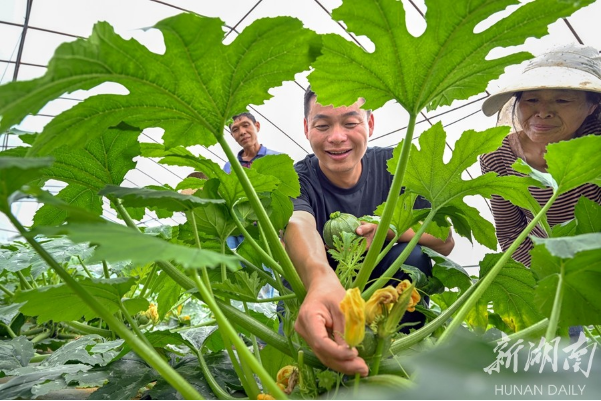More and more young people returned to start a business in their hometowns in recent years. They are new-type farmers who spearhead local development. Most of them are post-80s and 90s who have few farming experiences but engage in using their knowledge and ability to benefit the locals. On the occasion of China’s Youth Day, which falls on May 4th, let us learn about the stories of some returned Hunan youths.

Tang Qing, born in 1997 in Yiyang City, got employed in a real estate firm that paid good wages in Changsha after she graduated from high school. In 2017, she quit and returned to her hometown with her father to plant rice and canola. In 2018, she founded a home farm in Heshan District, planting rice of more than 1,600 mu (nearly 107 hectares). In 2021, double-cropping rice cultivation area in her farm exceeded 3,300 mu (more than 220 hectares). As a result, Tang has become a leading farmer with the most extensive rice cultivation area in the district, with an annual yield of double-cropping rice of more than 3 million yuan.
The photo shows Tang Qing operating a UAV for farming at Mixiang Village, Heshan District, Yiyang.

Hu Linping was born in 1994 in Hanshou County. She returned to her hometown in 2017 and learned to make traditional pear syrup candy from her father. In 2021, she founded a food company specializing in pear syrup candy production and marketing. This year, she conducted two live-streaming shows on Douyin, the Chinese version of TikTok, every day, lasting more than 7 hours in total, to promote her products. Despite the epidemic, more than 1,500 boxes of candies were sold on the peak day. Between January and March, more than 60,000 boxes of candies were sold, with a sales volume of over 1.2 million yuan. The company has employed 28 local villagers.
The photo shows Hu Linping (1st, L) and workers packing the pear syrup candy at the workshop of her company.

Yu Yinbo, born in 1988 in Ningxiang, worked in Beijing after she graduated from college. In 2012, she and her husband returned to start a business in her hometown. She founded an eco-agricultural development company that engages in flower planting and research and development of Chinese roses and rose seedlings. The products are sold to foreign markets. As a result, more than 50 local villagers got employed, and increased their income.
The photo shows Yu Yinbo (1st, L) and villagers packing the flowers transported to the flower markets in Changsha.

Shen Huijin, 40 years old, is a senior new-type farmer. He quit a well-paid job overseas and returned to his hometown Liuyang in 2014. Based on a large rice planting area, he innovatively adopted an “internet+” and grid-based marketing mode to build up his agricultural brand. In 2016, he collaborated with 14 cooperatives in 4 surrounding townships, with Longfu Town as the center, establishing a farmer cooperative and founded Liuyang’s first 10,000-mu (667 hectares) quality rice plantation. The whole course of rice production in this plantation has been mechanized.
The photo shows Shen Huijin facilitating an insect trap beside the field.

Li Li, born in 1985, was one of Hunan’s first batch of college-graduate-turned village officials. He is currently the deputy Party secretary and village director of Xinwu Village, Yanglousi Town, Linxiang. He is also the president of a wild vegetable cooperative which he founded in 2012. Over the past decade, the cooperative members increased from 5 to 433, the transferred land expanded from 3 mu to 1,685 mu (more than 112 hectares), and the per capita income of the cooperative members grew from 800 yuan to 6,560 yuan. As a result, this cooperative has become a national demonstration.
The photo shows Li Li (M) guiding villagers to pick vegetables in a greenhouse.

The photo shows Pan Xingyun (1st, L), a member of the “Panshi Youth” organization, introducing the tourists at Kaihui Town, Changsha County.

The “Panshi (rock) Youth” is an organization of college students and veterans who commit themselves to promote rural revitalization. The five members, 22 years old on average, come from around the country. They settled in Kaihui Town last March and since then, explored an entrepreneurship model of new-type talents serving the countryside based on local revolutionary resources. In addition, they provide reception and guide services in the scenic spots and plan and organize various themed activities, which helps facilitate the local development of the cultural tourism industry.

The photo shows Xu Haiming (2nd, R) operating farm machinery for spring plowing at Shashi Village, Shashi Town, Liuyang City.
This article is from the Hunan Provincial Government www.enghunan.gov.cn.
Translator: Pang Yuehui
Chinese source: hunantoday








